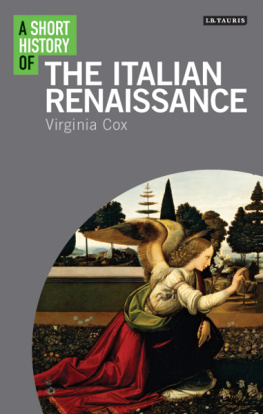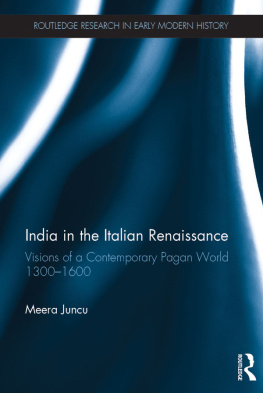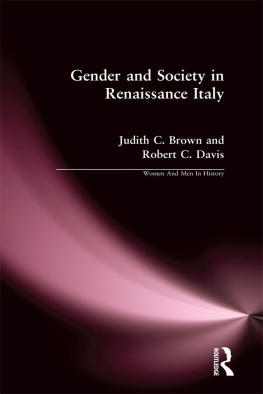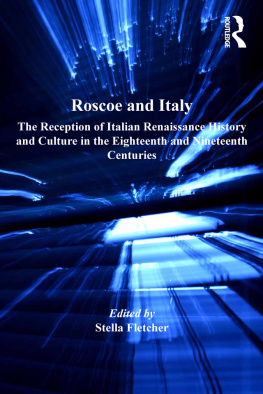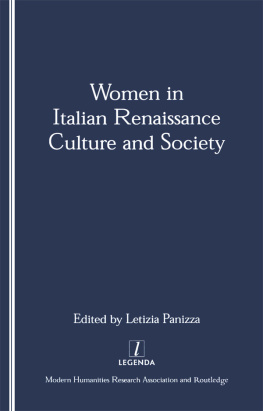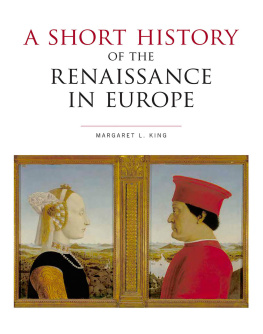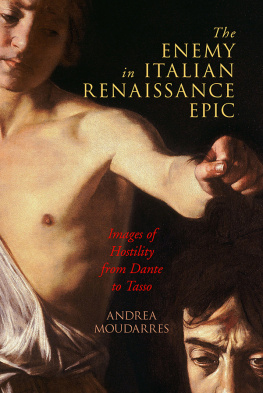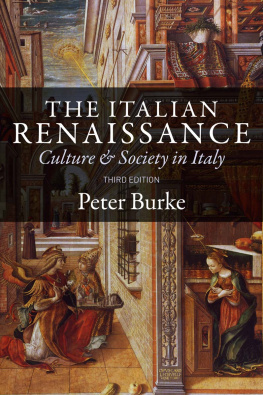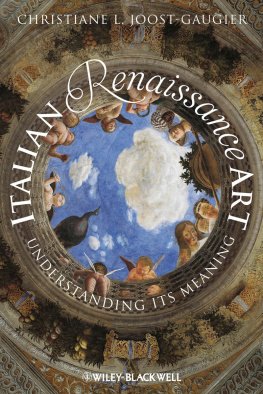Virginia Cox - A Short History of the Italian Renaissance
Here you can read online Virginia Cox - A Short History of the Italian Renaissance full text of the book (entire story) in english for free. Download pdf and epub, get meaning, cover and reviews about this ebook. year: 2016, publisher: I.B.Tauris, genre: History. Description of the work, (preface) as well as reviews are available. Best literature library LitArk.com created for fans of good reading and offers a wide selection of genres:
Romance novel
Science fiction
Adventure
Detective
Science
History
Home and family
Prose
Art
Politics
Computer
Non-fiction
Religion
Business
Children
Humor
Choose a favorite category and find really read worthwhile books. Enjoy immersion in the world of imagination, feel the emotions of the characters or learn something new for yourself, make an fascinating discovery.
- Book:A Short History of the Italian Renaissance
- Author:
- Publisher:I.B.Tauris
- Genre:
- Year:2016
- Rating:3 / 5
- Favourites:Add to favourites
- Your mark:
- 60
- 1
- 2
- 3
- 4
- 5
A Short History of the Italian Renaissance: summary, description and annotation
We offer to read an annotation, description, summary or preface (depends on what the author of the book "A Short History of the Italian Renaissance" wrote himself). If you haven't found the necessary information about the book — write in the comments, we will try to find it.
A Short History of the Italian Renaissance — read online for free the complete book (whole text) full work
Below is the text of the book, divided by pages. System saving the place of the last page read, allows you to conveniently read the book "A Short History of the Italian Renaissance" online for free, without having to search again every time where you left off. Put a bookmark, and you can go to the page where you finished reading at any time.
Font size:
Interval:
Bookmark:

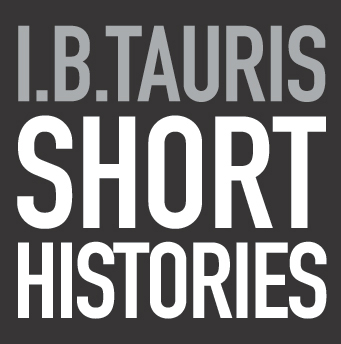
I.B.TAURIS SHORT HISTORIES
I.B.Tauris Short Histories is an authoritative and elegantly written new series which puts a fresh perspective on the way history is taught and understood in the twenty-first century. Designed to have strong appeal to university students and their teachers, as well as to general readers and history enthusiasts, I.B.Tauris Short Histories comprises a novel attempt to bring informed interpretation, as well as factual reportage, to historical debate. Addressing key subjects and topics in the fields of history, the history of ideas, religion, classical studies, politics, philosophy and Middle East studies, the series seeks intentionally to move beyond the bland, neutral introduction that so often serves as the primary undergraduate teaching tool. While always providing students and generalists with the core facts that they need to get to grips with the essentials of any particular subject, I.B.Tauris Short Histories goes further. It offers new insights into how a topic has been understood in the past, and what different social and cultural factors might have been at work. It brings original perspectives to bear on the manner of its current interpretation. It raises questions and in its extensive bibliographies points to further study, even as it suggests answers. Addressing a variety of subjects in a greater degree of depth than is often found in comparable series, yet at the same time in concise and compact handbook form, I.B.Tauris Short Histories aims to be introductions with an edge. In combining questioning and searching analysis with informed history writing, it brings history up-to-date for an increasingly complex and globalized digital age.
www.short-histories.com
This is a short and pithy book by an outstanding scholar at the top of her game. Prioritizing literature, it uses newly-discovered or unfamiliar writings to re-describe social classes, as well as topics like individualism and gender. Its innovative chapters on and especially Renaissance Woman help to reset the agenda for understanding the Italian Renaissance, making this book an invaluable twenty-first-century guide, not only for students but for the rest of us as well.
Alison Brown, Emerita Professor of Italian Renaissance History, Royal Holloway, University of London, author of The Renaissance
Virginia Coxs short history of the Italian Renaissance is an exemplary introduction concise, lucid, elegant, balanced, perceptive and accessible. It summarizes traditional views of the Renaissance, especially Jacob Burckhardts, criticizes them, and offers a revised interpretation of the movement. Coxs Renaissance is, in her own words, broader and deeper than its predecessors. She places more emphasis than usual on the coexistence and conflict between different ideas and styles. She re-interprets Burckhardts idea of Renaissance individualism with the aid of recent work on social psychology. Her book includes discussions of the applied arts, notably fashion, as well as a chapter on , based on the authors own research. Students will be grateful for this book, general readers will enjoy it, and fellow-scholars will be appreciative of the knowledge and thought underlying its apparently effortless production.
Peter Burke, FBA, Emeritus Professor of Cultural History, University of Cambridge, author of The Italian Renaissance
Virginia Coxs creative, original, and well-argued study of the Italian Renaissance should be on the bookshelf of every reader interested in the period. Cox gives attention not only to classical scholarship and those who practised it, but also to those who used it in their everyday lives. She presents short, judiciously chosen case studies that illuminate Renaissance art-making and collecting. And she writes with an expert hand about what it was like to live as a man or woman in the Renaissance, again by limiting her focus to exemplary cases that illuminate much larger realities. This short volume should be a go-to book for scholars teaching courses in the Renaissance as well as for general readers who want an introduction to the period that wears its considerable scholarship lightly. The writing throughout is crisp and elegant, with not a wasted word in sight.
Christopher S Celenza, Charles Homer Haskins Professor of Classics and German and Romance Languages and Literatures, Johns Hopkins University, author of Machiavelli: A Portrait and The Lost Italian Renaissance: Humanists, Historians, and Latins Legacy
Virginia Coxs rich, thought-provoking and elegantly written introduction to the Italian Renaissance conceives the cultural movement widely and inclusively, and encourages us to see it in new ways. Cox shows how it was rooted in an emulative and endlessly inventive dialogue with the models of ancient Rome and Greece that responded to, and was made more urgent by, the new needs of expanding cities and commerce. The cultural production that she considers includes of course literature, fine art, music and thought, but also material culture (including cooking and fashion), geography and science. Cox argues convincingly that the Renaissance in Italy should be seen as lasting until as late as the start of the seventeenth century, and as multipolar, with important developments emerging as much from princely courts as from the republics of Florence and Venice. Her approach enables her to go beyond the cultures of the social elites to study those of the literate urban classes in general. Perhaps most strikingly, she can devote equal space to Renaissance man merchants, courtiers and artists in a broad sense and to Renaissance woman, the secular and religious figures whose engagement with culture flourished most fully towards the end of the period. This finely judged book achieves much more than one might expect from a short history. It should be read and pondered by anyone interested in the Italian Renaissance, whether they are experienced scholars, students or non-specialists.
Brian Richardson, Emeritus Professor of Italian Language, University of Leeds, author of Manuscript Culture in Renaissance Italy
A Short History of
the American Civil War
Paul Anderson (Clemson University)
the American Revolutionary War
Stephen Conway (University College London)
Ancient China
Edward L Shaughnessy (University of Chicago)
Ancient Greece
P J Rhodes, FBA (Durham University)
Ancient Rome
Andrew Wallace-Hadrill (University of Cambridge)
the Anglo-Saxons
Henrietta Leyser (University of Oxford)
the Byzantine Empire
Dionysios Stathakopoulos (Kings College London)
the Celts
Alex Woolf (University of St Andrews)
Christian Spirituality
Edward Howells (Heythrop College, University of London))
the Crimean War
Trudi Tate (University of Cambridge)
English Renaissance Drama
Helen Hackett (University College London)
the English Revolution and the Civil Wars
David J Appleby (University of Nottingham)
the Etruscans
Corinna Riva (University College London)
the Hundred Years War
Michael Prestwich (Durham University)
Irish Independence
J J Lee (New York University)
the Italian Renaissance
Virginia Cox (New York University)
the Korean War
Allan R Millett (University of New Orleans)
Medieval Christianity
G R Evans (University of Cambridge)
Medieval English Mysticism
Vincent Gillespie (University of Oxford)
the Minoans
John Bennet (University of Sheffield)
Next pageFont size:
Interval:
Bookmark:
Similar books «A Short History of the Italian Renaissance»
Look at similar books to A Short History of the Italian Renaissance. We have selected literature similar in name and meaning in the hope of providing readers with more options to find new, interesting, not yet read works.
Discussion, reviews of the book A Short History of the Italian Renaissance and just readers' own opinions. Leave your comments, write what you think about the work, its meaning or the main characters. Specify what exactly you liked and what you didn't like, and why you think so.

